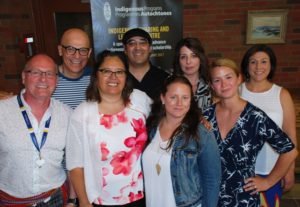Mastering relations: degree program seeks to strengthen, lead

By Laura E. Young
SUDBURY– Family is never far from Ian Desjardins’ plans for his Master of Indigenous Relations (MIR) Studies at Laurentian University, starting with his own family and then moving onto a larger, global stage.
The member of Kitigan Zibi Anishabeg in Maniwaki, Quebec says that he wants to “provide a framework and be a positive role model for [his] children and other children in the community in which [he works].”
Desjardins, a married father of two, is in his second year of the program, commonly known as MIR. He is also working as a volunteer at the Muskegowuk Environmental Research Centre (MERC) in Timmins, Ontario.
On a broader level, his MIR studies also connect him to the larger documents of Canada’s Truth and Reconciliation Commission and the United Nations Declaration on the Rights of Indigenous People.
Laurentian’s MIR can help “this reconciliation to happen on the grassroots level,” he says. “This is very important because not many people understand what reconciliation looks like.”
He thinks of using his education to help develop an organization or a consultation model with an indigenous approach to how business is operated in Northern Ontario, he says.
“Today we go into a meeting, shake hands, say what we’re going to say and walk away. But in an Indigenized approach to relationship building, we go live with the individuals on the land. We hear the stories. We understand where they’re coming from…That’s part of the process that’s missing,” added Desjardins.
That’s the kind of talk Taima Moeke-Pickering, director of the School of Indigenous Relations, likes to hear.
After nearly four years of development, that included consultations with First Nations communities, the MIR accepted its first cohort of students in 2015.
The program connects with larger issues, and students have to write a thesis, says Moeke-Pickering.
“They come with ideas initially of what topics they’d like (to study). Cancer, environment, mining. These issues are also at the forefront of what’s going on with the Truth and Reconciliation. We have issues about increasing indigenous education. A lot of these topics have been covered by these students,” stated Moeke-Pickering.
Many of the students have also become employed, working in indigenous relations in Health Sciences North, Laurentian and in research projects in various indigenous communities, she says.
Some of the MIR students have travelled to the United Nations in New York; presented thesis topics at the Healing our Spirit Worldwide Conference in New Zealand last November; and visited indigenous communities and environmental sites on a field study in Mexico in October 2014.
“Who knows where we’ll be going next? We’ve had lots of support from Goodman School of Mines for funding, as well as our Dean and other funds coming in from the university. A lot of our students have been winning awards for their presentations,” says Moeke-Pickering.
As well as the MIR, Laurentian has been integrating Aboriginal content across the undergraduate level.
In May, the university announced it would be mandatory for undergraduate students in arts programs to have six credits worth of Indigenous content.
In this way, further understanding of Indigenous history and culture and today’s realities and cultures is promoted, according to a university press release.
Laurentian currently offers 100 courses with more than 50 per cent Aboriginal content, the university added in the release.


